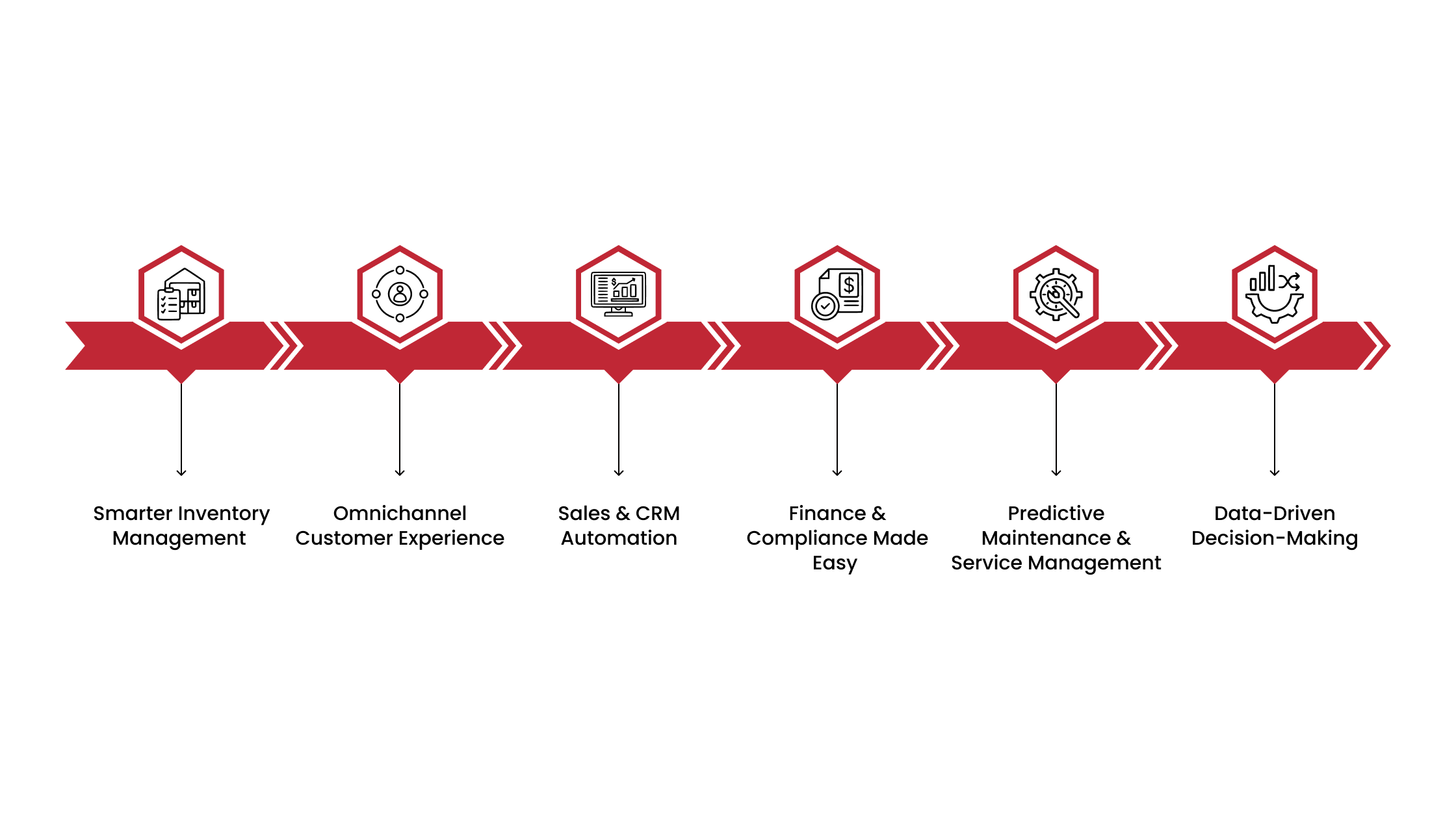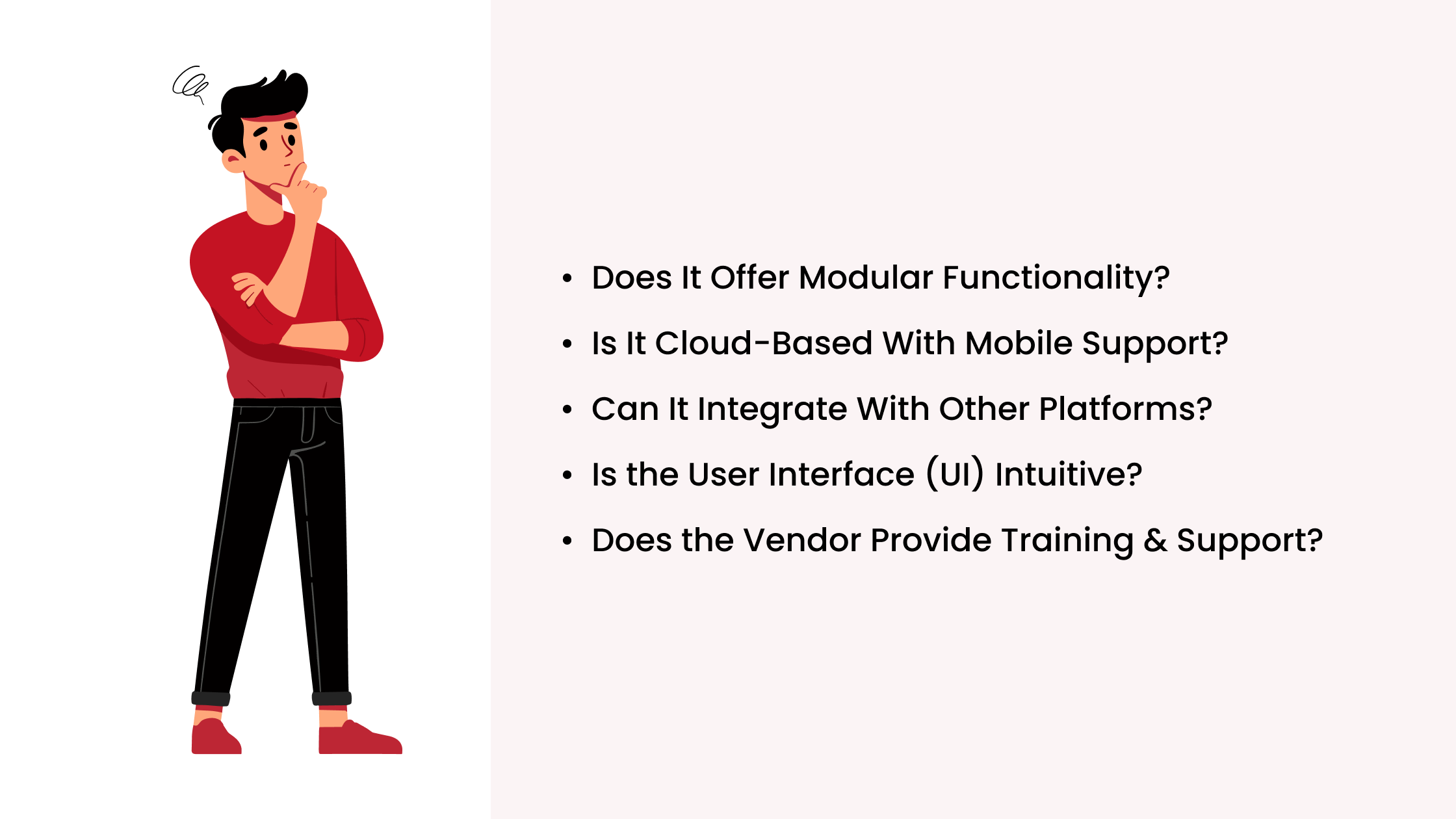How Next-Gen Dealer Management Systems Are Transforming the Automotive Industry

Many dealerships are struggling with disconnected systems, outdated software, and manual processes that slow down sales, limit visibility, and frustrate customers. These inefficiencies make it challenging to meet buyer expectations for speed, personalization, and a seamless online-to-showroom experience.
According to a 2025 Boston Consulting Group (BCG) report, 80% of dealership leads are now generated online, making digital readiness essential. A core part of that modernization is upgrading to a next-generation Dealer Management System (DMS), a cloud-based, AI-enabled platform that centralizes operations, delivers real-time insights, and integrates seamlessly with other business programs.
In this blog, we’ll discuss how next-gen DMS solutions are helping dealerships streamline operations, improve customer engagement, and position themselves for sustainable growth in a digital-first automotive industry.
What Is a Dealer Management System (DMS)?
A Dealer Management System (DMS) is an integrated software solution that helps automotive dealers manage various aspects of their business, such as:
- Inventory
- Sales
- Finance and accounting
- Service and maintenance
- Customer relationship management (CRM)
Modern DMS platforms enable data-driven decision-making, automation, and seamless customer experiences across online and offline touchpoints.
Conventional vs. Next-Gen DMS: A Quick Comparison
While regular Dealer Management Systems once formed the core of auto dealerships, today’s fast-paced, customer-driven market demands more. Legacy systems often lack the flexibility, integration, and intelligence modern dealerships need.
Next-gen DMS platforms fill this gap with cloud-based, AI-powered solutions built for scalability, automation, and seamless user experiences across departments and locations.
Top 6 Ways Next-Gen DMS Is Transforming the Automotive Industry

Next-gen Dealer Management Systems streamline operations, enhance customer experiences, and open new opportunities for growth. Here are the six ways they’re transforming the automotive industry.
1. Smarter Inventory Management
A top pain point for dealers is dead stock, vehicles that sit unsold for months. This ties up capital, takes up valuable space, and reduces profitability. Regular inventory management systems often fail to provide the predictive insights needed to avoid these problems.
Next-gen DMS resources, powered by AI, enable more innovative stocking strategies, reduce waste, and optimize supply chain responsiveness, keeping inventory lean, relevant, and aligned with market demand.
Next-gen DMS offers:
- AI-powered forecasting: Helps dealers order the right inventory mix.
- VIN-level tracking: Real-time visibility of every car across multiple branches.
- Auto-alerts: Low inventory, price drop, and test-drive follow-up triggers.
Example: A DMS can automatically suggest transferring a popular car model from a low-demand location to a high-demand branch, improving cash flow.
2. Omnichannel Customer Experience
Today’s automotive customers arrive well-informed, having researched online, compared models, and reviewed feedback before visiting a dealership.
Your DMS must meet them where they are. Consumers now expect dealerships to deliver a seamless, consistent experience across websites, mobile apps, and physical showrooms.
An omnichannel-enabled DMS ensures that every customer interaction, digital or in-person, is personalized, tracked, and nurtured, creating a unified experience that boosts both trust and conversions.
Next-gen features include:
- Integrated online booking for test drives or service.
- Real-time chat and lead tracking.
- Digital contracts and remote e-signatures.
Google reports that 95% of car buyers use digital sources for research. Next-gen DMS platforms bridge the gap between online interest and offline purchase.
3. Sales & CRM Automation
With built-in CRM modules, a modern DMS automatically handles customer engagement from first click to closed sale. This automation includes follow-ups, reminders, lead prioritization, and customer retention strategies.
In a competitive market, speed and personalization make all the difference. Sales and CRM automation empower teams to act faster, stay organized, and personalize interactions, resulting in more leads, smoother handoffs, and higher closure rates.
- Scores lead using AI.
- Assigns them to the right sales reps.
- Sends reminders and follow-up sequences.
- Tracks sales team KPIs.
4. Finance & Compliance Made Easy
Paper-based processes and compliance challenges have been eliminated. The next-gen DMS streamlines financial documentation, regulatory compliance, and loan processing. By automating these sensitive areas, dealerships can reduce errors, accelerate approvals, and maintain full audit trails.
This is especially critical in markets with strict tax and financial reporting requirements. Digital finance programs also increase transparency and build buyer confidence, especially in remote or online transactions.
- Auto loan applications
- Credit score integration
- Compliance alerts
- e-Financing and e-Signing
It also integrates with government portals and tax systems, ensuring all documents are digitally stored, searchable, and compliant.
5. Predictive Maintenance & Service Management
After-sales is where profit lies. Beyond the initial vehicle sale, ongoing service and parts replacements provide recurring revenue. Next-gen DMS platforms transform workshops into smart service centers.
Using real-time vehicle data and predictive algorithms, these systems anticipate issues before they happen, improve workshop utilization, and automate scheduling, making after-sales a proactive, personalized, and profitable experience for customers and dealers alike.
Modern DMS platforms now integrate with connected car systems to:
- Predict service needs before they happen.
- Alert customers with personalized service messages.
- Automate booking and parts availability.
Example: The system alerts a customer about an oil change based on mileage + engine data, and auto-books a service appointment.
6. Data-Driven Decision-Making
Next-gen DMS platforms provide custom dashboards and real-time reports on major performance metrics. These insights empower dealership managers to spot trends, diagnose issues, and make informed strategic choices.
Whether it's evaluating staff performance, optimizing inventory, or forecasting sales, having data at your fingertips transforms guesswork into action. A data-driven culture not only boosts efficiency but also creates accountability and agility at every level of the dealership.
- Sales performance
- Customer satisfaction
- Workshop efficiency
- Inventory turnover
Challenges & Considerations When Selecting a Next-Gen DMS
While next-gen DMS systems offer massive potential, dealerships must plan carefully.
- Migration Costs: Transitioning from legacy systems may require upfront investment and training.
- Data Security: Choosing vendors with robust encryption and compliance (GDPR, ISO) is essential.
- Staff Training: Ensure every employee, from sales to service, is trained to use the platform effectively.
- Customization: One-size doesn’t fit all. Select a DMS that suits your business scale, segment, and market.
How to Choose the Right Dealer Management System?

Before making an investment, consider the following essential DMS features, factors and questions to ensure your dealership adopts the right technology:
1. Does It Offer Modular Functionality?
Your DMS should support core dealership processes like sales, service, parts, accounting, and CRM in a modular or integrated way. Modular systems allow you to implement what you need now and scale up later without overpaying or overcomplicating the system.
Check whether it includes service bay scheduling, parts inventory, digital finance resources, and full customer lifecycle management.
2. Is It Cloud-Based With Mobile Support?
A cloud-based DMS provides anytime, anywhere access and reduces the need for expensive on-site hardware or IT support. This is especially crucial for multi-location dealerships or remote team access. Mobile compatibility ensures that your team, sales reps, service advisors, and managers can stay productive from their phones or tablets, whether on the showroom floor or in the field.
Can It Integrate With Other Platforms?
Integration is essential for a digital ecosystem. Ensure the DMS supports open APIs and can seamlessly connect with OEM systems, inventory platforms, payment gateways, digital marketing resources (like Google Ads or Facebook), and third-party CRMs.
Integration allows for a more unified customer experience, reduces manual data entry, and ensures real-time synchronization across systems.
3. Is the User Interface (UI) Intuitive?
A good DMS should be easy to learn and use for all levels of staff, from tech-savvy managers to front-desk personnel and mechanics. A clean, intuitive UI reduces the learning curve, boosts productivity, and minimizes errors.
Request a demo and allow your team to test the system’s navigation, search features, and overall usability before making a decision.
4. Does the Vendor Provide Training & Support?
Even the best system is useless if your team doesn’t know how to use it. Look for a DMS provider that offers comprehensive onboarding, ongoing training resources, and responsive customer support.
Ask about support response times, service level agreements (SLAs), and whether they provide on-site or virtual training for different roles within your dealership.
That’s where ATN comes in, offering proven virtual and in-dealership training that equips every department with the skills to perform at their best. Our programs strengthen sales, service, and leadership for lasting results.
Boost Dealer Management System Performance with ATN

Ensuring your team understands your DMS’s full capabilities is essential for maximizing ROI, improving workflows, and enhancing the customer experience. Our complete dealership management solutions empower your staff to utilize every feature effectively, turning technology into a true competitive advantage.
What ATN Delivers to Your Dealership:
- Proven experience serving over 12,000 dealerships with tailored training and management programs
- A dedicated team of six experts in sales, fixed operations, digital marketing, branding, and project management
- In-depth knowledge of CRM workflows, inventory optimization, and financial performance analysis
- Ongoing coaching sessions to establish and reach monthly objectives
- Comprehensive reviews of revenue and advertising spend to drive maximum profitability
- A customized mix of virtual and on-site support that fits your dealership’s unique needs
Connect with ATN today to discover how our comprehensive dealership management program can drive sales growth, boost efficiency, and strengthen your dealership’s profitability.

